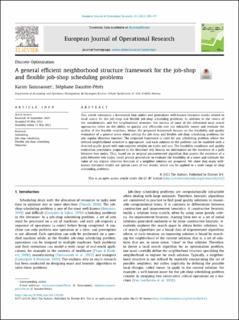A general efficient neighborhood structure framework for the job-shop and flexible job-shop scheduling problems
Peer reviewed, Journal article
Published version
Permanent lenke
https://hdl.handle.net/11250/3086160Utgivelsesdato
2023Metadata
Vis full innførselSamlinger
Originalversjon
European Journal of Operational Research. 2023, 311 (2), 455-471. 10.1016/j.ejor.2023.05.018Sammendrag
This article introduces a framework that unifies and generalizes well-known literature results related to local search for the job-shop and flexible job-shop scheduling problems. In addition to the choice of the metaheuristic and the neighborhood structure, the success of most of the influential local search approaches relies on the ability to quickly and efficiently rule out infeasible moves and evaluate the quality of the feasible neighbors. Hence, the proposed framework focuses on the feasibility and quality evaluation of a general move when solving the job-shop and flexible job-shop scheduling problems for any regular objective function. The proposed framework is valid for any scheduling problem where the defined neighborhood structure is appropriate, and each solution to the problem can be modeled with a directed acyclic graph with {non-negative weights on nodes and arcs}. The feasibility conditions and quality estimation procedures proposed in the literature rely heavily on information on the existence of a path between two nodes. Thus, based on an original parameterized algorithm that asserts the existence of a path between two nodes, novel generic procedures to evaluate the feasibility of a move and estimate the value of any regular objective function of a neighbor solution are proposed. We show that many well-known literature results are special cases of our results, which can be applied to a wide range of shop scheduling problems.

